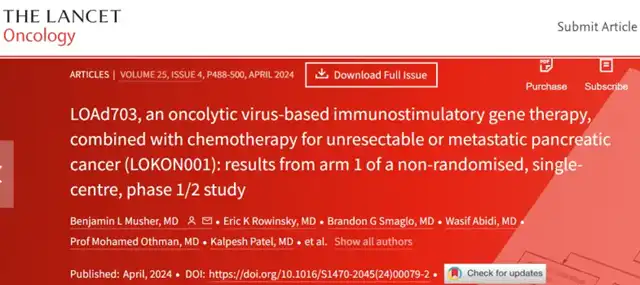Breakthrough on Oncolytic Virus Therapy for Pancreatic Cancer
- Normal Liver Cells Found to Promote Cancer Metastasis to the Liver
- Nearly 80% Complete Remission: Breakthrough in ADC Anti-Tumor Treatment
- Vaccination Against Common Diseases May Prevent Dementia!
- New Alzheimer’s Disease (AD) Diagnosis and Staging Criteria
- Breakthrough in Alzheimer’s Disease: New Nasal Spray Halts Cognitive Decline by Targeting Toxic Protein
- Can the Tap Water at the Paris Olympics be Drunk Directly?
Breakthrough on Oncolytic Virus Therapy for Pancreatic Cancer
- Should China be held legally responsible for the US’s $18 trillion COVID losses?
- CT Radiation Exposure Linked to Blood Cancer in Children and Adolescents
- FDA has mandated a top-level black box warning for all marketed CAR-T therapies
- Can people with high blood pressure eat peanuts?
- What is the difference between dopamine and dobutamine?
- How long can the patient live after heart stent surgery?
Breakthrough on Oncolytic Virus Therapy for Pancreatic Cancer
Breakthrough in Pancreatic Cancer Treatment! Oncolytic Virus Therapy Shows Safety and Feasibility.
Pancreatic ductal adenocarcinoma (PDAC) is one of the most common subtypes of pancreatic cancer, prone to micro-metastasis, with a 5-year survival rate of only 10%. While immunotherapy has changed the landscape of cancer treatment over the past decade, its effectiveness in PDAC has been limited due to its low immunogenicity and unique tumor microenvironment (TME).
Remodeling the tumor microenvironment has become a major strategy in PDAC treatment. Oncolytic viruses are natural or genetically modified viruses that can selectively infect and kill tumor cells with minimal damage to normal cells. These viruses mainly work by directly lysing tumor cells and indirectly enhancing the host’s anti-tumor immune response. LOAd703 is an oncolytic adenovirus that exhibits cancer selectivity in its oncolytic action, infecting nearby immune cells and stromal cells, inducing the expression of CD40L and 4-1BBL without lysing them.
Recently, a study published in The Lancet Oncology showed that LOAd703 combined with albumin-bound paclitaxel (NAB-P) + gemcitabine is safe and feasible for the treatment of advanced pancreatic ductal adenocarcinoma.

The LOKON001 study is a non-randomized, phase 1/2 study consisting of two substudies, and the results of the first substudy were disclosed in this announcement. The first substudy included 21 patients aged 18 years and older with unresectable or metastatic pancreatic ductal adenocarcinoma who had previously received treatment or were untreated between 2016 and 2019. All patients received standard 28-day cycles of NAB-P (125 mg/m2) + gemcitabine (1000 mg/m2, up to 12 cycles) + LOAd703 (every 2 weeks). The 21 patients received 500 μL of LOAd703, with injections of 5×1010 (dose 1, 3 patients), 1×1011 (dose 2, 4 patients), or 5×1011 (dose 3, 14 patients) virus particles per injection into the pancreatic tumor or metastatic lesions, for a total of 6 injections.
The primary endpoints of the study were the safety of at least one dose of LOAd703 and the immune response after treatment. The median follow-up was 6 months (cut-off date January 5, 2023). The study showed that the most common adverse events after treatment were anemia [96/1237 (8%)], lymphopenia [86/1237 (7%)], hyperglycemia [70/1237 (6%)], leukopenia [63/1237 (5%)], hypertension [62/1237 (5%)], and hypoalbuminemia [61/1237 (5%)].
The most common adverse events attributed to LOAd703 were fever [14/21 (67%)], fatigue [8/21 (38%)], chills [7/21 (33%)], and elevated liver enzymes (alanine aminotransferase elevation in 5 cases, alkaline phosphatase elevation in 4 cases, aspartate aminotransferase elevation in 4 cases), except for transient grade 3 transaminase elevation seen only with dose 3 administration, all others were grade 1-2.
The study did not reach the maximum tolerated dose, so dose 3 was determined to be the highest safe dose of LOAd703 in combination with NAB-P and gemcitabine. Among the 16 patients evaluable for T-cell assays, 15 patients (94%) showed an increase in the proportion of CD8+ effector memory cells and adenovirus-specific T cells after LOAd703 injection. Among the 18 evaluable patients, 8 (44%) achieved objective responses.
In summary, this study demonstrates that the strategy of LOAd703+NAB-P+gemcitabine is safe and feasible for treating advanced pancreatic ductal adenocarcinoma. Based on the results of the first substudy, LOKON001 is currently conducting the second substudy (LOAd703+NAB-P+gemcitabine+atezolizumab).
Many medical experts also recommends oncolytic virus therapy: oncolytic virus therapy is safe and effective in patients with pancreatic cancer, and suggests conducting large-sample, high-quality clinical studies to expand the indications of oncolytic viruses in patients with pancreatic cancer.
Let us look forward to the clinical application of oncolytic virus therapy, bringing new hope for more cancer patients.
Breakthrough on Oncolytic Virus Therapy for Pancreatic Cancer
References:
- Musher BL, Rowinsky EK, Smaglo BG, et al. LOAd703, an oncolytic virus-based immunostimulatory gene therapy, combined with chemotherapy for unresectable or metastatic pancreatic cancer (LOKON001): results from arm 1 of a non-randomised, single -centre, phase 1/2 study. Lancet Oncol. 2024 Apr;25(4):488-500. doi: 10.1016/S1470-2045(24)00079-2. PMID: 38547893.
- Schnittert J, Bansal R, Prakash J. Targeting Pancreatic Stellate Cells in Cancer. Trends Cancer. 2019 Feb;5(2):128-142. doi: 10.1016/j.trecan.2019.01.001. Epub 2019 Feb 1 . PMID: 30755305.
- Ge Weiyu, Wang Hongxia. Immunotherapy for pancreatic ductal adenocarcinoma – challenges and opportunities [J]. Journal of Clinical Hepatobiliary Diseases, 2019, 35(5): 958-963. DOI: 10.3969 /j.issn.1001- 5256.2019.05.005.
(source:internet, reference only)
Disclaimer of medicaltrend.org
Important Note: The information provided is for informational purposes only and should not be considered as medical advice.



